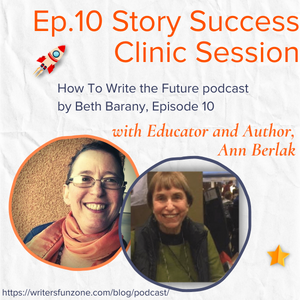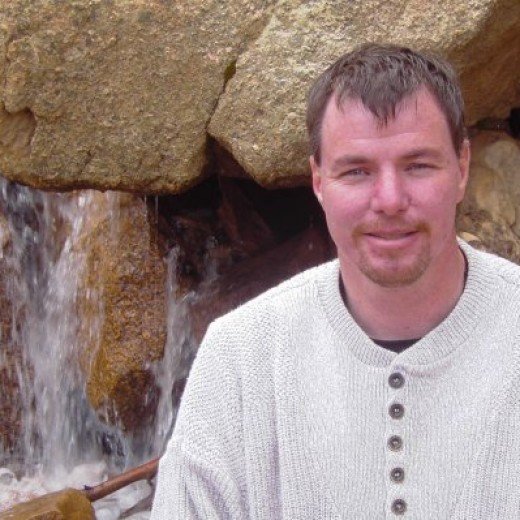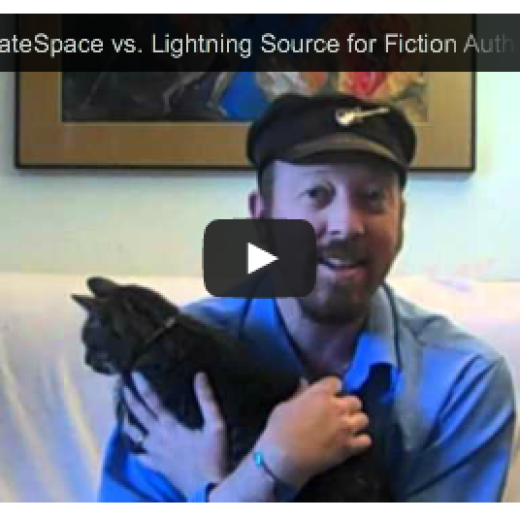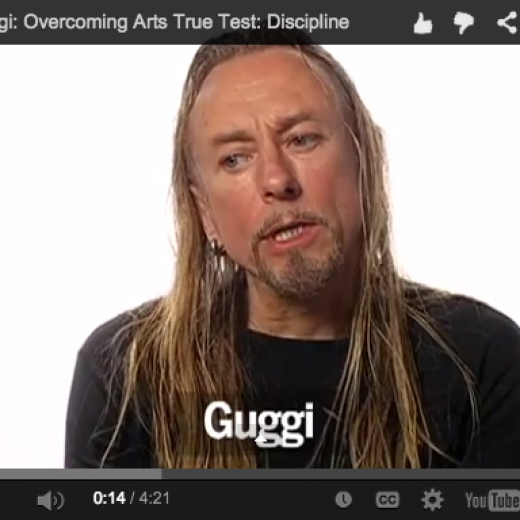Story Success Clinic with Educator and Author, Ann Berlak
In the first Story Success Clinic feature on the How To Write The Future podcast, Beth Barany talks to Ann Berlak.
Have a listen to episode 10 here: Buzzsprout | Apple Podcasts | Google Podcasts | Spotify | Amazon Music | Podcast Addict | Listen Notes| Youtube
ABOUT BETH BARANY
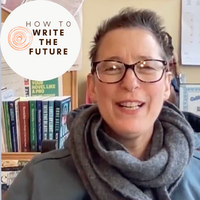 Beth Barany is an award-winning novelist, master neurolinguistic programming practitioner, and certified creativity coach for writers, including being a workshop leader & keynote speaker. Beth has published books in several genres including young adult fantasy, paranormal romance, and science fiction mystery.
Beth Barany is an award-winning novelist, master neurolinguistic programming practitioner, and certified creativity coach for writers, including being a workshop leader & keynote speaker. Beth has published books in several genres including young adult fantasy, paranormal romance, and science fiction mystery.
Learn more about Beth Barany at these sites:
Author site / Coaching site / School of Fiction / Writer’s Fun Zone blog
RESOURCES
Sign up for the 30-minute Story Success Clinic here:
https://writersfunzone.com/blog/story-success-clinic/
Creativity Coaching for Writers:
Plan Your Novel Like A Pro: And Have Fun Doing It – book by Beth and Ezra Barany
SHOW NOTES
“When you’re giving other people feedback, you learn how to articulate what’s working and what’s not working.”
In the first Story Success Clinic feature, creativity coach and science fiction/fantasy novelist Beth Barany talks to author and educator, Ann Berlak, where they discuss ways to write about different cultures with sensitivity, how to write characters readers will relate to, and ways to promote your books.
ABOUT ANN BERLAK
Ann Berlak’s life’s work has been teaching teachers to teach for social justice in public elementary schools. Since she retired, she’s been learning to write fiction for young people that will inspire them to envision and promote a more just and joyful world. She can be reached at anncberlak@yahoo.com. See her book, Joelito’s Big Decision/La Gran Decisión de Joelito, http://www.hardballpress.com/joelito.html and on Facebook: https://www.facebook.com/joelitosbigdecision.
TRANSCRIPT for 10. Story Success Clinic with Educator and Author, Ann Berlak
Hey science fiction and fantasy authors, would you like to get more exposure for your books, and get some support to uncover story ideas, enhance story cohesion, and get some ideas for marketing?
Then sign up for my 30 minute Story Success Clinic interview on my podcast, How To Write The Future.
Every 30-minute story success clinic is recorded and gets aired as an episode of the How To Write The Future podcast.
So sign up today. The link is in the show notes. And now let’s get on with the show.
INTERVIEW
BETH BARANY
Hi, everyone. Welcome to How To Write The Future podcast. I’m Beth Barany, your host. This podcast is for science fiction and fantasy writers who want to write positive, optimistic futures because when we vision what is possible, we help make it so.
Welcome everyone. This is a 30 Minute Story Success Clinic with my guest. Today I have with me Ann Berlak, who is a writer and educator.
Ann, please introduce yourself, and welcome.
ANN BERLAK
Well, I’ve never really heard Beth say what the focus of this podcast is, but by some magic miracle of the universe, she’s defined what my goal is in writing a book, which I’ve been writing since I retired. I’ve been writing for about five years and I think I might get some help from her. I was a teacher educator at San Francisco State. I taught elementary school prospective elementary school teachers. And I taught them to teach for social justice that they wanted to teach for the seventh generation. And so when I retired, I went into some classrooms right around the time of Occupy and into some elementary school classrooms to teach, to try out what I’d been preaching for 30 years.
And I had the most fun just talking, teaching, whatever I wanted to do. I didn’t have to use the curriculum. And I, I was talking with my friend, Betty, who was the teacher of record there about a trip that she took to France and how she went into a hospital because she was sick. And when she asked for the bill, they said, oh, you don’t have to pay anything here.
And then when, they handed her the medications and told her she didn’t have to pay my inspiration was a kid. A boy sitting in the back of the room, his face will never, ever leave my imagination. It was a look of surprise that you could go anywhere in the world and have your healthcare taken care of.
And he said out loud, ” I’m going to France.” And I realized that he couldn’t even imagine a world where everyone would get the healthcare they needed. And so I decided — I’ve ever since a child, I’ve wanted to write fiction, but I have never done it except for one small book that I wrote that was for really, for young, very young children.
So that’s how I got started in writing.
BETH BARANY
Oh, that’s fabulous. And so we’re here today to, to hone in on maybe one or two of the challenges that you’re having in your current work. And you let me know ahead of time that you’re working on something that could be classified as science fiction because it’s set in the future. Is that right?
ANN BERLAK
Well, it’s happening in my imagination in upstate New York. Right now, but it has a long history in my imagination that started after the civil war. And after talking with you about science fiction, and you were saying it could be science fiction. Well, I guess it just depends on what science fiction is.
BETH BARANY
Absolutely. I mean, a lot of people define it as stories that are inspired by science or inspired by making things operate differently in the world that we have them. And there, it kind of crosses over into fantasy you could say. is it an alternative present? so it sounds like you’re working kind of on an alternative present, which includes an alternative history. And that’s all under the umbrella of speculative fiction where we’re making up new rules of society, new rules of being in the world, new rules of interacting with each other.
ANN BERLAK
Right.
BETH BARANY
So what attracted you to jump on this opportunity? What is the challenge that you’re having? And then we’ll talk about it and see if I can help you sort things out..
ANN BERLAK
Well as I said, I was inspired by years and years of elementary school teaching and realizing that children, young adults and adults — that none of us really have an image that another world is possible, that a really possible existing world that doesn’t require any different laws of nature. And how would it set up? And in all of my years of teaching, I had read quite a bit about alternative ways of organizing the world and people’s utopian visions.
And so I had some ideas about what other people had thought of and I wanted to create a world where , actually, these people have interaction with the rest of the world. They live in a town called Clarity.
The premise of the book is that a black family in Oakland is evicted. The father has just died, but they’re invited by an aunt to come and live in a place called Clarity, which had its origins just after the Civil War that black and white people, abolitionists and native Americans, got together and created a world that was very egalitarian.
I think that’s the main thing, but it was also very cooperative and there was mutual caring. As opposed to being individualistic and capitalists, people were very social oriented and cared about one another. The reason I had its long history is that it would certainly take a long time for people that have been socialized to capitalist competitive ideas to have those reduced, even though back in the 1870s, they weren’t as strong as they are today –the capitalist assumptions– , it was very individualistic.
The opening scene as the father has died and they’re pack, they’re worried about being evicted and then they find out they’re evicted and they are going to Clarity much against their will because they don’t like this aunt who talks about how you can’t even have your own cars in Clarity. And you have to share all your money when you get there. And the son in the story, there’s a sister and brother and mother that are going, he doesn’t like the idea that he could never get rich. He wants very much to be able to get rich and give things to his mother and his sister.
So part of the story is how they, he and his sister 15 and 17 years old, how they adjust to this other world and how they think about, and what it, what its assets and its liabilities are. And then there’s another story going on at the same time that there is a family, and actually the whole outside world is really against clarity because it threatens their values. So there’s that struggle too.
I’ve worked a lot with those formulaic things to get the structure right. And I, I really worked at , and I’ve got the structure and I’ve gotta a plausible story, but I don’t think it’s a page turner.
I haven’t had much feedback except I paid one person who helped me do that part of it ,to get a good structure for that would work with the climax and the denouement, just at the right, almost the right places. And sometimes I’m a good fiction writer, not great, but good.
But now I’m ready. I think the characterization needs to be really changed. And I think that I’m very aware as a white woman writing a black family, but I couldn’t help it. It was what I envisioned so much because here in Oakland, those are the issues. And I grew up in St. Louis, where there was a large group of African Americans.
So I know a little bit of something I’ve always read that, but anyway, I’m aware I did it knowing that I’m making my job much harder, but my imagination didn’t work with, I, I think I know more about poor black people than I do about poor white people. Neither one of which is my culture anyway.
BETH BARANY
So your question about how to make it a page turner and then you zeroed in on the first thing that I was thinking about, which is, are your characters compelling? Do they come alive?
ANN BERLAK
Actually, I think I have the guy better because he was a friend that his name is Brandon in the book, the brother, a really great kid. And I’ve been in touch with Brandon, who is now a comedian in Los Angeles. And he tried to give me some feedback or he wanted to give me some feedback, but I could see that he was just doing a good job. He’s trying to write fiction too. But I guess, from his response, I, I wanted him to just go in and write it and make it funny and, but, but that was not to be. And, so I don’t quite know what I need to do to make it a page turner. It has mystery in it and coincidences and things that come together. But, it may be beyond my capacity to do it, especially at this age.
BETH BARANY
Well, it sounds like you’ve learned a tremendous amount in the time you’ve been writing. So you could learn, you could learn a few more skills if you want.
ANN BERLAK
Yeah, Yeah. Really I’ve been spending the past three or four weeks since my grandkids went home, just waiting to see, and then you showed up.
What should I do? Should I quit? I mean, I really
BETH BARANY11:04
Don’t quit. So I, I, so I have some advice for you. And, and the first thing is something that you touched on before we started recording, which is getting readers of the culture you’re writing about. So African American readers people call them sensitivity readers for them to give you feedback on whether or not you are the mark, so to speak.
ANN BERLAK
Where, I’m missing.
BETH BARANY
Right where you’re missing the mark and where you’re hitting the mark too.
So there are resources there and I can, I can send them to you afterwards and I can. Could share some general resources with people. There’s a lot of wonderful resources out there on Writing The Other. It’s called, What do we do when we’re writing of cultures that aren’t ours?
ANN BERLAK
I’ve done so much research on different things that would connect, but never on that. So that’s great.
BETH BARANY
Mm, oh, good, good. The other is from purely a characterization point of view. And there’s a chapter of this in my book, plan Your Novel Like A Pro. We have a chapter on Emotional Core, which is all about how do you make the characters relatable. And a big part of that is really making it clear to the reader: What is at stake for them?
ANN BERLAK
Yeah. And I, I think I’ve had one of your books at some point. And, the idea that’s in my mind, what is at stake, but maybe that to center that.
BETH BARANY
To center that. Absolutely.
And then the third piece that we look at when we creating a page turner is the simplest way I can say is question and reveals.
So there’s a first a question. And then like in chapter one, the big question, and then in chapter two, or seem to, you reveal part of it and you ask a new question and now we, as the reader, like what, how, how are they gonna figure that out?
And so you stagger questions and revelations, answers really, that through the characters. The characters wanna know the readers, want to know..
ANN BERLAK
Well, and that’s what it is like, are we really going to Clarity? No, we’re not. Yes you are. And then when you get there, is it so terrible is. and I’ve done that, but what was the one you mentioned just before that was the one I haven’t done. The, the first thing. said, do you remember?
BETH BARANY
We talked about Emotional Core. So making characters relatable.
ANN BERLAK
there’s something about character that I don’t know.
And you were talking about a chapter in your book.
BETH BARANY
Yes. So the chapter is Emotional Core. And in the Plan Your Novel Like A Pro book. We first talked about stakes. What’s at stake?
ANN BERLAK
What that stake? Yeah. I don’t know exactly if I’ve zeroed in on that.
BETH BARANY
Also making our characters relatable.
ANN BERLAK
Yeah. And I, I know that that’s a rule. I don’t know how well I’ve done it. But I think. I think I’ve gotta really change my idea of the, I think my main character, all of a sudden it dawned on me. I had this idea that it was her emotional journey. I think I made her too naive in the first place, you know, had a lot to learn, and she becomes a spokesperson in a sort of whoever that girl is, from the Netherlands or whatever, you know who, I mean.
BETH BARANY
Oh, yeah. The young woman who speaks for the environment.
Yes. I know. Greta Greta
Thornberg.
ANN BERLAK
My character, Kayla ends up kind of like that, but she starts, she doesn’t have to start from such a lowly place..
BETH BARANY
Yeah. And that can also relate to relatability. Relatability isn’t likability. It’s making the person feel like we can relate to them because they care for others, and they have some kind of strength that we admire some kind of quality that we admire and we pity them, not like, oh, they’re so low. But when characters show a little bit of vulnerability, we connect as readers, we relate to them.
ANN BERLAK
It’s interesting that you use the word pity. There’s another word for it, but pity is looking down on them as opposed to this other word that we have empathy for them. One of the things I wanna know is how to– I, I get teared up so easily with anything that I read, I’ve been trying to figure out how to write it so that people will really get emotionally involved. think I’ve done it.
BETH BARANY
Yeah for so absolutely. And, and to help them get emotionally involved , one of the biggest things I notice writers leave out is using the five senses and, and all the sensory language that we can, and that will allow the reader– we automatically port ourselves into other people as part of human nature, and we can make it easier as writers when we communicate through our words in our fiction, not just what they see, but what they hear and the nuances of taste and smell, but also the body, all the body sensations. There’s actually a lot of senses happening inside the body, how our body is in space, how we feel physically, but then of course the additional piece of feeling emotional.
ANN BERLAK
Right. And I somehow, , gosh, knows how I ended up writing in the first person. and I don’t know if it was a mistake or not.
BETH BARANY
So, are you writing in present tense or past tense? First person present tense.
ANN BERLAK
Yes. And I have no idea how I did that. If I didn’t even choose it, I just did it.
BETH BARANY
That’s very common because that’s the closest to our own reality.
ANN BERLAK
Mm-hmm
BETH BARANY
Uh, now it does it, it can feel, it can restrict you. You could try and write a scene in third person past tense as an exercise. Take your very first scene and switch it into third person past tense. And see if that allows you a little bit more flexibility or distance.
It can be very challenging writing in the present first person, present tense. It’s not, it’s not something I would choose, but there are books out there like that, like Hunger Games.
ANN BERLAK
Mm-hmm.
BETH BARANY
And when I read that book, it was almost like too much in my face personally. I like the distance that third person past tense provides.
So that’s another way to help you as an author, maybe have some more choices.
So another piece around knowing if your book is a page turner is getting feedback, hiring editors or, or working with critique partners to help you and give feedback from people who don’t really know you, but are getting to know you through your writing.
It, it’s a great way also to learn. When you’re giving other people feedback, you learn. How to articulate what’s working and what’s not working.
ANN BERLAK
Hmm, I told you I hired that one woman and she gave me five, four or five years worth of worth to do. And from one 800 dollar critique. So I thought it was very worth. It that’s my MFA.
BETH BARANY
Yeah. Yeah.
ANN BERLAK
I haven’t been able to get in a decent critique group. I tried through that children’s book group and it was just a group that didn’t gel. So I
BETH BARANY
Yeah,
ANN BERLAK
who you have some ideas about how to do this. I could pay some, but I, you know, maybe I should pay one more person.
BETH BARANY
You could, absolutely. You’re part of our community Fellowship Of The Pen. You could, if you use Facebook, we have a Facebook group. You could put a request out there.
Yep. Yeah, yeah. You can also and I’m opening this up to anyone who would like, if you. If you’re on my mailing list.
So a little plug to join my mailing list, and you have a, a request for looking for a critique partner or a critique group, send me a short paragraph that you, that I can put in my newsletter over, you know, 3,500 people get that
ANN BERLAK
Well, how, how many of them are African American? What percentage would you?
BETH BARANY
I, I don’t know. I actually don’t know a lot of the people they’re from around the world.
ANN BERLAK
How would you know him necessarily?
BETH BARANY
Well, you, you would ask, you would ask and I would also recommend that you reach out to this group and I’ll, I’ll share it with you after our, our, our talk here and also, and I’ll put it into the show notes about Writing The Other. There’s a lot of resources and the
teachers who teach probably
ANN BERLAK
I didn’t even know that. I can’t believe I’ve done so much research on so many different things. I now know what the
Aron look like for instance, and this and that kind of stuff, but I’m really excited that there’s a whole clump of Writing about the Other that I don’t know about.
BETH BARANY
Yeah. That’s so great. So as we wrap up for today what is one thing or two, but what, what do you foresee as your next step? Next two steps that you foresee doing in the short term that will help you get moving on everything we talked about?
ANN BERLAK
Well, one thing will be to use some of your ideas to tie again, to see if I can find someone that really wants to join me. If I send you what I want and when, how soon did your newsletter come, go out?
BETH BARANY
It generally goes out about once a week lately. I’ve been
sending it out. Yeah.
ANN BERLAK
so I could, that would definitely be a step. And I wanna look there’s one book called Writing The Other, and then there’s a lot of other books too, about that.
BETH BARANY
probably
ANN BERLAK
just one that you’re
BETH BARANY
Yeah. And I’m not sure if that’s the exact title, so I’ll, I’ll be putting that into the show notes. And actually that is a whole class there’s multiple classes actually. And a group of people working in that space.
Um, yeah.
ANN BERLAK
it’s all online now,
BETH BARANY
Yep. Yep.
So where Ann, where can people find out more about you to, to hear about when your book comes out?
Where’s the best place for people to reach you?.
ANN BERLAK
Well, I don’t have, I have a website that’s called Joelito’s Big Decision. And that was a bilingual, Spanish bilingual, beautifully illustrated book about a boy that’s going for his hamburger, his weekly hamburger at McMan’s restaurant. And when he wants to go in and he is very hungry, he sees his best friend and his best friend’s father.
And they’re standing there striking for higher pay . Anyway, that’s the best I have for a website. I could probably expand it now and just rename it as Ann’s books or something like that. But the best place would be to write me an A N N C as in cat. B E R L a K yahoo.com.
Anybody that’s interested in, especially anybody that would be interested right now in, and they don’t have to be African American to give me feedback. But I would also appreciate that any Black people that are interested in this story, it’s, it’s a really good idea and a good story. I hope to do justice to it.
BETH BARANY
Yeah, that’s great. Well, I’m really appreciative Ann, that you signed up for this 30 minute Story Success Clinic. Thank you so much. I look forward to hearing about your next steps.
So tell me how you feel, Ann.
ANN BERLAK
I feel really reinvigorated. I was just at the point of thinking I should keep doing this at the age of 84 actually, or whether I needed to find another project of some sort, and I’ve invested a lot of time and I’ve had a great deal of fun and I didn’t really wanna quit. And I’ve been bugging my friends on, should I keep going and not? So I feel like I’m gonna keep going.
BETH BARANY
I’m so glad to hear that. Well, thank you so much, Ann, and have a wonderful rest of your day. Stay cool. And I’ll definitely be in touch.
ANN BERLAK
Okay.
take care.
BETH BARANY
Take care. Bye bye.
ANN BERLAK
Bye bye.
OUTRO
Beth
Write long and prosper.
Science fiction and fantasy sign up for your 30 minute Story Success Clinic and get more exposure for your books.
Loved this episode? Leave us a review and rating here: https://www.buzzsprout.com/2012061
or in your podcast home of choice.
***
Connect with Beth Barany
Twitter: https://twitter.com/BethBarany
LinkedIn: https://www.linkedin.com/in/bethbarany/
Email: Beth@BethBarany.com
ABOUT THE HOW TO WRITE THE FUTURE PODCAST
The How To Write The Future podcast is for science fiction and fantasy writers writers who want to write positive futures and bring those stories successfully out into the marketplace. Hosted by Beth Barany, science fiction novelist and creativity coach for writers.
ABOUT BETH BARANY
Beth Barany is an award-winning novelist, certified creativity coach for writers, and a workshop facilitator. In addition to her how-to books for writers, Beth has published books in several genres including young adult fantasy, paranormal romance, and science fiction mystery.
CREDITS
EDITED WITH DESCRIPT: https://www.descript.com?lmref=_w1WCA (Refer-a-Friend link)
MUSIC CREDITS :
Music from Uppbeat (free for Creators!): https://uppbeat.io/t/soundroll/fuzz-buzz
License code: UMMKDRL02DFGKJ0L. “Fuzz buzz” by Soundroll.
Commercial license: https://musicvine.com/track/soundroll/fuzz-buzz.
DISTRIBUTED BY BUZZSPROUT: https://www.buzzsprout.com/?referrer_id=1994465 (Refer-a-Friend link)
SHOW PRODUCTION by Beth Barany
SHOW NOTES by Kerry-Ann McDade
2022 BETH BARANY
For more “How To Write the Future” episodes, go here.
If you’d like to invite Beth onto your podcast, drop her a note here.

